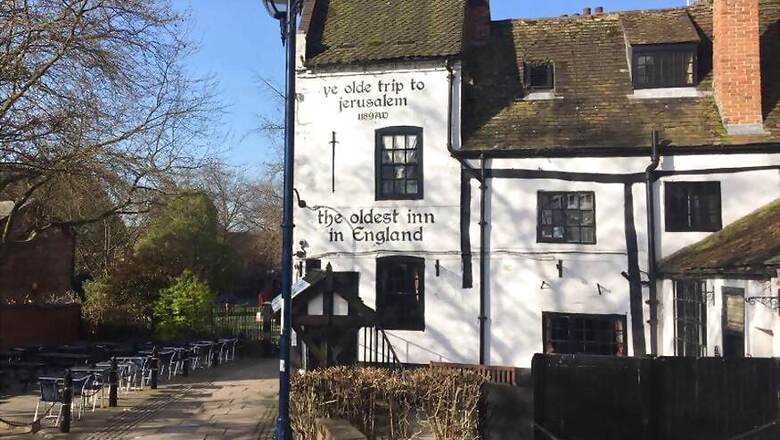
views
 Hark! The very floor you stand judders softly and if you listen closely, you could pick up hoof-falls from battle-ready horses, clang of swords and hushed whispers of devout pilgrims who think destiny has summoned them to this inn in Nottingham in England, only to set them off on a pilgrimage to a far-off land the following morn. It is a pilgrimage where they would fight with the infidels and perhaps die all for their deep faith in the church.
Hark! The very floor you stand judders softly and if you listen closely, you could pick up hoof-falls from battle-ready horses, clang of swords and hushed whispers of devout pilgrims who think destiny has summoned them to this inn in Nottingham in England, only to set them off on a pilgrimage to a far-off land the following morn. It is a pilgrimage where they would fight with the infidels and perhaps die all for their deep faith in the church.
The inn, clung to the side of a rocky castle, is one of their last stopovers before the journey to their final battleground in the east at Jerusalem begins.
Some called the sport 'the Crusades.'
Drinking at the ‘Ye Olde Trip To Jerusalem’ in Nottingham, the oldest inn in England, is a trip back in time. It would take you back to some happening moments 800 years ago, where you could conjure (after perhaps downing a mug of ale) the spectres of brave men to settle around you in rickety chairs, bellow out for drinks, oblivious of a snoopy visitor from future.
One could easily imagine Richard I, the Lionheart, who ruled England in the 12th century, sitting hunched over a pitcher of ale surrounded by his generals and knights, generations of them, rolling into the hall with tumultuous uproar and in hushed voices broaching strategies to free the holy land from the Saracen infidels.
Much courage, much foolishness, much hope, much despair, much world-weariness could all have dunked their souls in the coarse ale poured and sloshed around inside these dim-lit rooms.
There are intricate caves deep below in this inn, where a brewstore once functioned. That serpentine cellar still holds in its dim-lit entrails, 900 years of miasma of ale-infused breaths of men (people claim that a strange whiff still comes alive at times), musty walls and creaking timber.
Mind it. The inn was born in 1189 AD.
What holds your eyes in rapt attention at the rock lounge as you climb a short flight of stairs from the entrance of the inn is a model ship hanging from the ceiling. Caked with decades of dust, veiled in beds of cobweb, the galleon, which could have been gifted to the inn by some sailor, is now but a cursed spectre.
Local legends warn you from brushing your hands against the ship that tempts as much as it could to dust up its length. Three men who tried to clean the ship in the past met gory ends, the stories tell us. None attempted again, ever since the tragedy.
The inn’s fascination with spectres does not stop with the galleon.
Keys disappear, an old-world perfume — lavender or rose water — suddenly wafts across the hall, glasses and bottles fly off shelves and smash themselves open when no one is around (no one never found any shards of glass on the floor. The ghost in the inn is more aural and olfactory than visual). Dogs avoid a clock hanging on a wall and only howl at it from a distance with terror gleaming in their eyes.
Many hold the ghost of ‘Yorkey’, George Henry Ward, who owned the pub between 1894 and 1914 responsible. But, if a place has a history of nearly a 1000 years, it is foolish not to look beyond what is obvious, closer, and in the immediate neighbourhood in time.
Fingers are pointed at Roger de Mortimer, English nobleman and de facto ruler of England. He is known to have colluded with his lover Queen Isabella in disposing off the body of her husband, Edward II.
Eventually, the villain was hunted out and hanged by Isabella’s son, Edward III.
Legend has it that Montgomery met his ladylove in a secret chamber somewhere deep in the cellar, which is connected to the castle far above through one of its serpentine arms, yet to be unearthed.
At the inn, you’d feel all the 800 years of history in a single glass of ale you hold in your hand. Dare to begin your crusade?
(Manu Remakant is a freelance writer who also runs a video blog - A Cup of Kavitha - introducing world poetry to Malayalees. Views expressed here are personal)
















Comments
0 comment